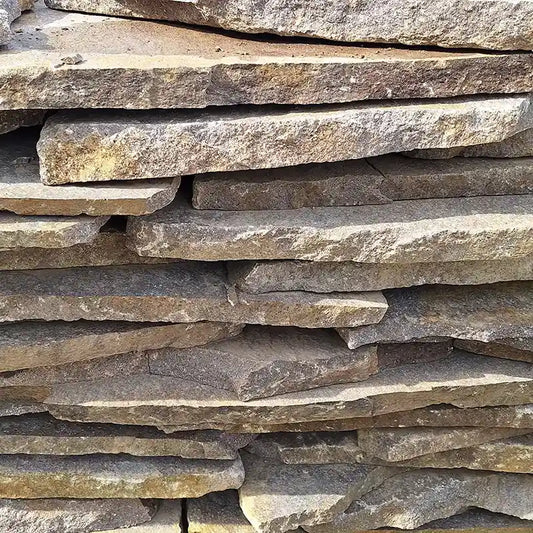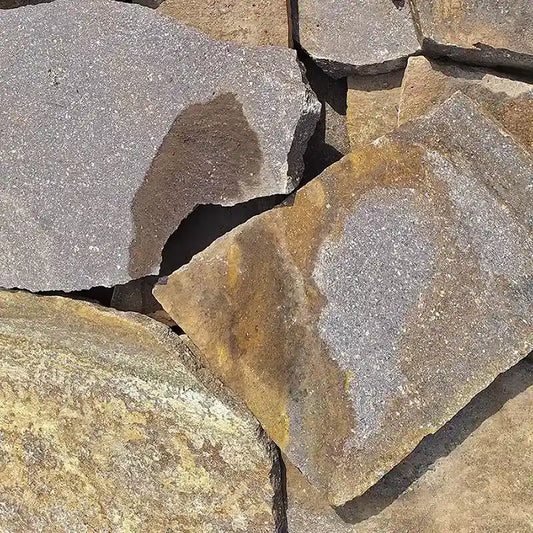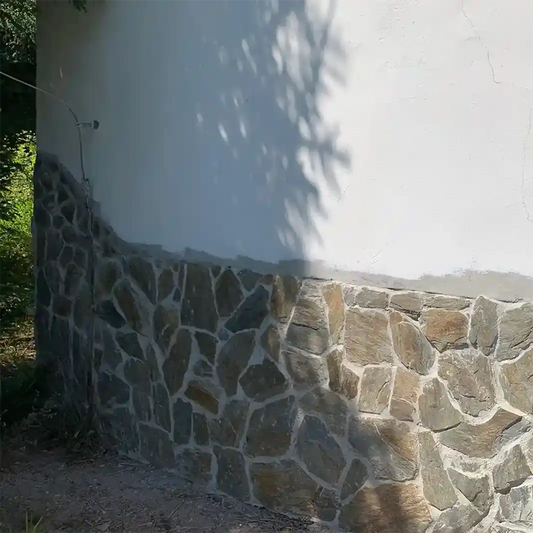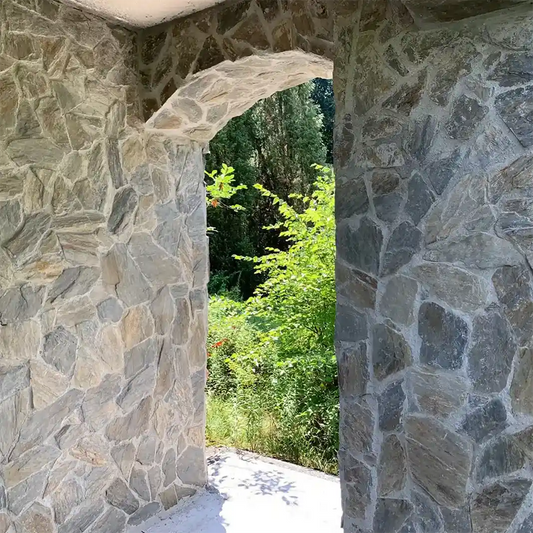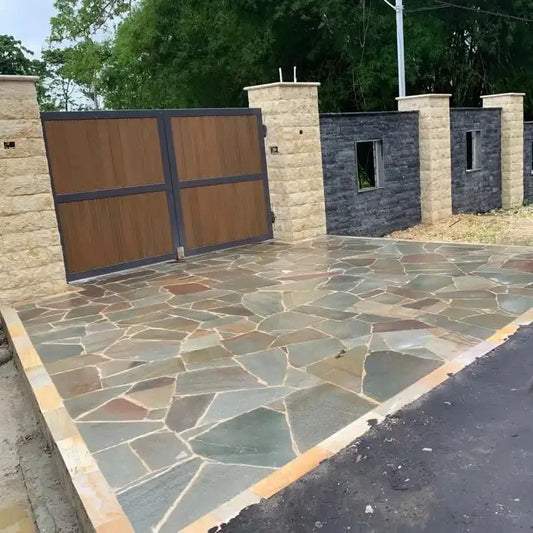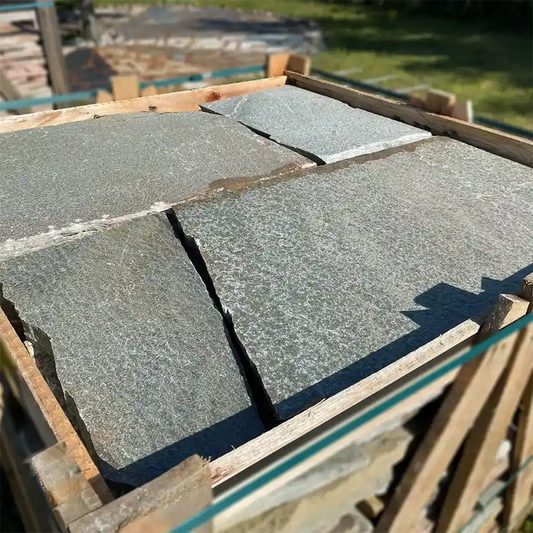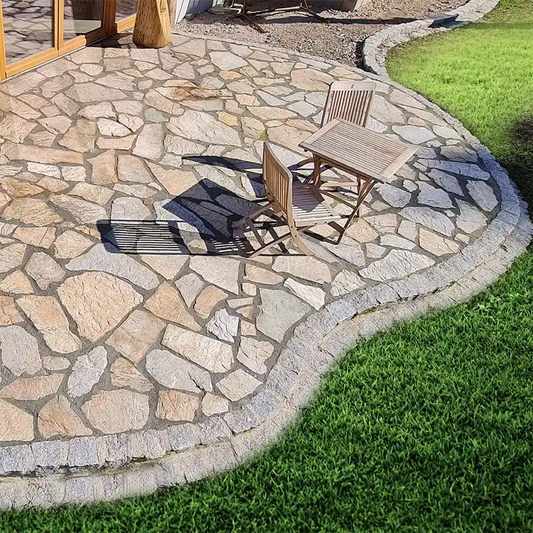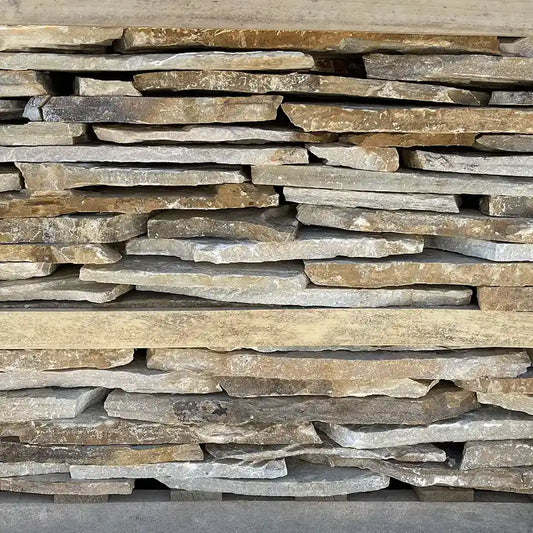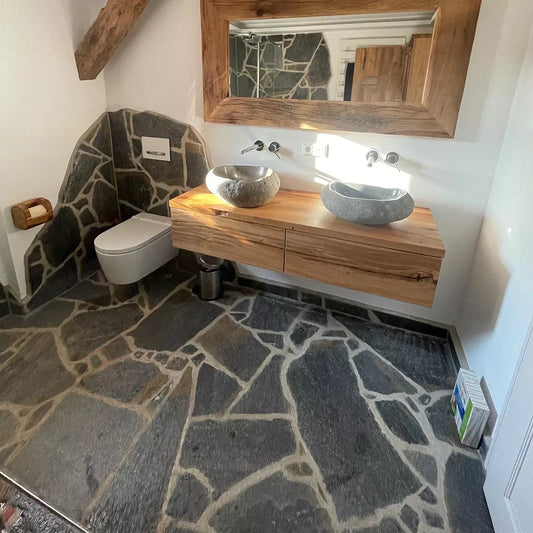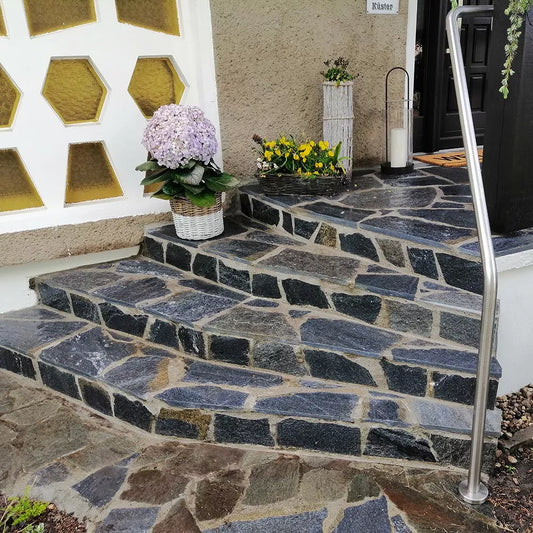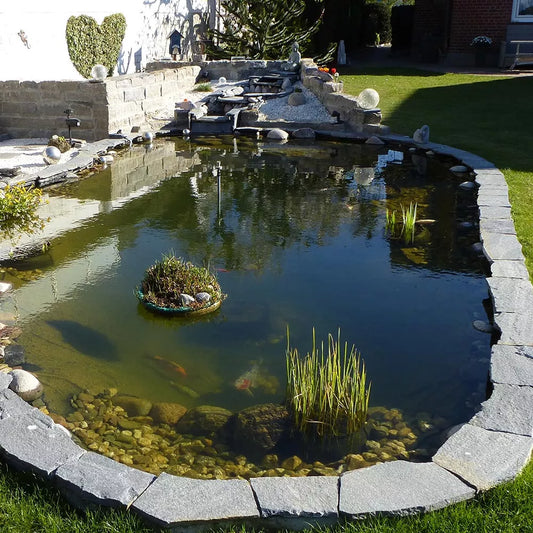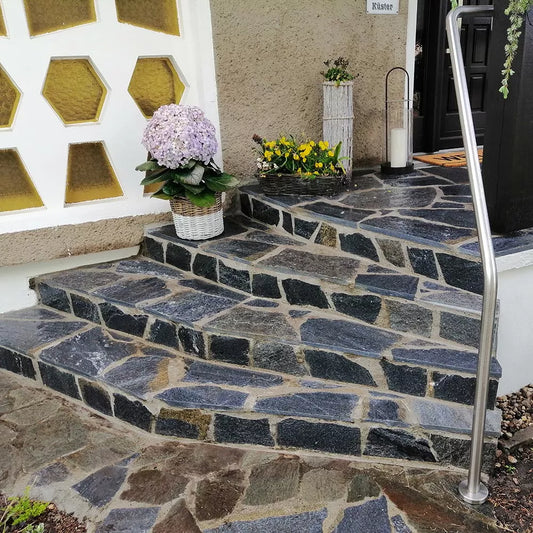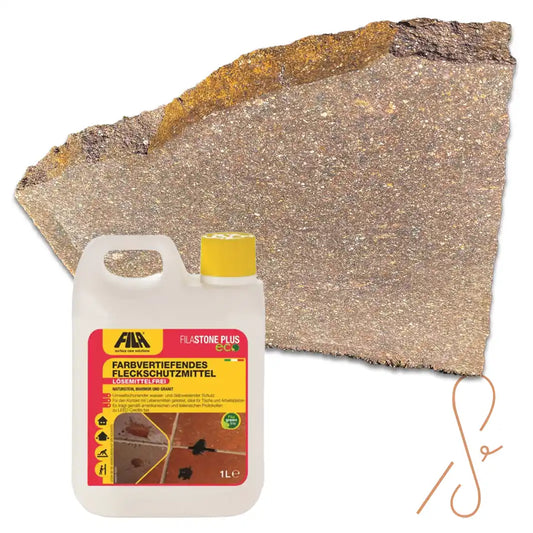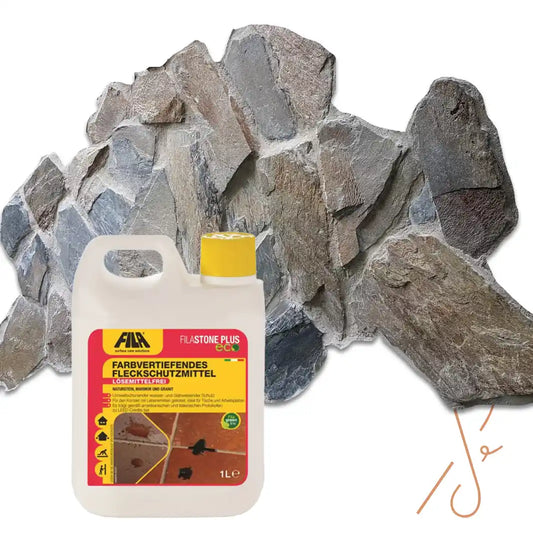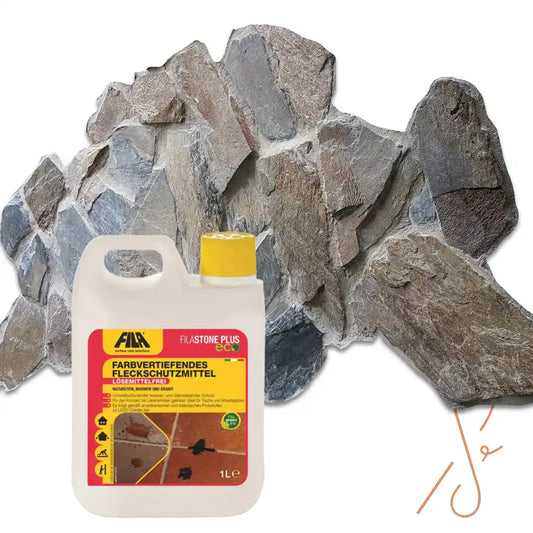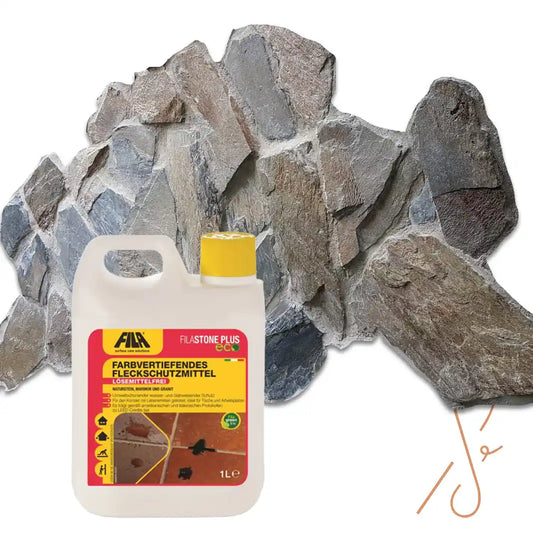
Every natural stone is unique.
Collection: Natural stone slabs - Natural, beautiful, and durable
Aesthetic diversity and elegant natural stone slabs for garden, terrace, paths, and facades
Our wide range of natural stone slabs offers the perfect solution for every taste. Whether indoors or outdoors - we ensure that your home becomes even more beautiful with our natural stone slabs - with split rough surfaces! One of our bestsellers is Grauwacke, a natural stone that is excellent for use as flooring, wall cladding, or base cladding. Natural polygonal shapes combined with vibrant color nuances create a Mediterranean charm and special flair. You can also inquire about large Grauwacke natural stones, for example, with a size of 1.20 meters. We can usually deliver what nature provides. For use as flooring, slab thicknesses of at least 2 cm are particularly in demand. Use possibilities of "heavy stones", which we understand to be slab thicknesses of 6 cm and more, include garden paths, lawn stepping stones, or entrance or exit driveways. In some cases, the slabs can even serve as a ledge for a stream.
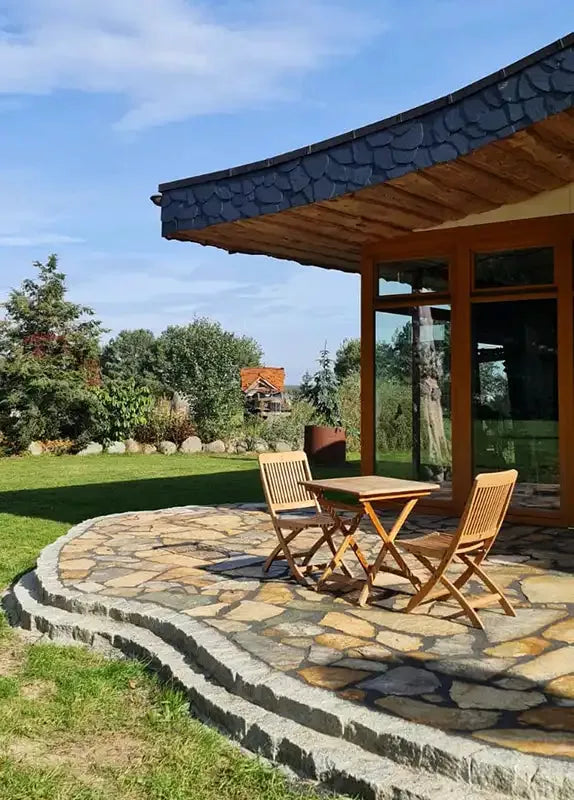
Naturstone slab selection: Greywacke, Quartzite, Slate, and Porphyry
-

Grauwacke natural stone
GRAYWACKE ASSORTMENTThe illustration shows an example or excerpt of the surface of a greywacke natural stone.
-

Quartzite natural stone slabs
10 TYPES OF QUARTZThe illustration shows an example or excerpt of the surface of a Polaris Quartzite.
-

Slate natural stones
3 SLATE VARIETIESThe illustration shows an example or excerpt of the surface of a Scabra slate.
-

Porphyry natural stone slabs
The image shows an example or section of the surface of a porphyry natural stone.to porphyry natural stone
All natural stone slabs made of quartzite, porphyry, graywacke, and slate in overview
Use the filters to sort by plate thickness, purpose, square meters, or stone type.
-
Porphyry polygonal slabs 2-4 cm
Vendor:bruchsteinplatten.deRegular price €6.780,00 EURRegular priceUnit price €56,50/m²€11.760,00 EURSale price €6.780,00 EURSale -
Graywacke facade stone 1-3 cm
Vendor:bruchsteinplatten.deRegular price €3.960,00 EURRegular priceUnit price €36,00/m²€9.130,00 EURSale price €3.960,00 EURSale -
Graywacke facade stone 1-3 cm
Vendor:bruchsteinplatten.deRegular price €4.260,00 EURRegular priceUnit price €35,50/m²€9.960,00 EURSale price €4.260,00 EURSale -
110 m² quartzite broken stone slabs Jasmares 2.5-4 cm for 58.50 €/m² shipping free
Vendor:bruchsteinplatten.deRegular price €6.435,00 EURRegular priceUnit price €58,50/m²€11.990,00 EURSale price €6.435,00 EURSale -
120 m² quartzite broken stone slabs Jasmares 2.5-4 cm for 58 €/m² shipping free
Vendor:bruchsteinplatten.deRegular price €6.960,00 EURRegular priceUnit price €58,00/m²€13.080,00 EURSale price €6.960,00 EURSale -
Quartzite Polygonal Slabs Clara
Vendor:bruchsteinplatten.deRegular price €4.730,00 EURRegular priceUnit price €43,00/m²€10.230,00 EURSale price €4.730,00 EURSale -
Quartzite Polygonal Slabs Clara
Vendor:bruchsteinplatten.deRegular price €5.100,00 EURRegular priceUnit price €42,50/m²€11.160,00 EURSale price €5.100,00 EURSale -
Quartzite Deep Sea polygonal slabs
Vendor:bruchsteinplatten.deRegular price €4.510,00 EURRegular priceUnit price €41,00/m²€10.010,00 EURSale price €4.510,00 EURSale -
Quartzite Deep Sea polygonal slabs
Vendor:bruchsteinplatten.deRegular price €4.860,00 EURRegular priceUnit price €40,50/m²€10.920,00 EURSale price €4.860,00 EURSale -
Polygonal slabs Quartzite Deep Sea 4-6 cm
Vendor:bruchsteinplatten.deRegular price €5.610,00 EURRegular priceUnit price €51,00/m²€11.110,00 EURSale price €5.610,00 EURSale -
Polygonal slabs Quartzite Deep Sea 4-6 cm
Vendor:bruchsteinplatten.deRegular price €6.060,00 EURRegular priceUnit price €50,50/m²€12.120,00 EURSale price €6.060,00 EURSale -
40-60 m² Porphyry polygonal slabs 2-4 cm including impregnation
Vendor:bruchsteinplatten.deRegular price From €3.037,54 EURRegular priceUnit price €75,94/m²€4.117,54 EURSale price From €3.037,54 EURSale -
100-120 m² porphyry polygonal slabs 2-4 cm including impregnation
Vendor:bruchsteinplatten.deRegular price From €6.145,08 EURRegular priceUnit price €61,45/m²€10.195,08 EURSale price From €6.145,08 EURSale -
5-30 m² Greywacke facade stone 1-3 cm including impregnation
Vendor:bruchsteinplatten.deRegular price From €513,77 EURRegular priceUnit price €102,75/m²€928,77 EURSale price From €513,77 EURSale -
40-60 m² graywacke facade stone 1-3 cm including impregnation
Vendor:bruchsteinplatten.deRegular price From €2.237,54 EURRegular priceUnit price €55,94/m²€3.517,54 EURSale price From €2.237,54 EURSale -
70-90 m² greywacke facade stone 1-3 cm including impregnation
Vendor:bruchsteinplatten.deRegular price From €3.376,31 EURRegular priceUnit price €48,23/m²€6.106,31 EURSale price From €3.376,31 EURSale
Current customer feedback
Polygonal terrace covering made of natural stone
Our natural stone quartzite slabs such as Deep Sea, Clara, Kallisto, or Lemuria Light, etc. come from Europe, unlike the well-known Rio Yellow and Rio Rosario quartz sandstones from Brazil. Quartzite slabs are also durable hard stones mainly used for outdoor areas and are frost-resistant. To maintain the external appearance, one should not exclude an impregnation in color-enhancing or natural effect version. We offer our slate slabs in three variants: Schiefer Negra, whose deep black has made its name, and the brothers with higher iron oxide content, which have a rusty look. We also offer Schiefer Scabra with light rust tones and Antigua Schiefer, which almost looks like an iron plate - ideal for borders around a grill or fireplace.
Our Grauwacke, quartzite slabs, and slate slabs are extremely robust and durable.
They can be ordered directly online from us, making them a perfect solution for landscaping or other outdoor projects. For indoor use, we recommend the use of finer slabs that provide a very elegant look. Our slate and quartzite stones are very popular and are excellent for floors, walls, or stairs. They can be used in combination with other materials such as wood, glass, or metal to achieve a unique aesthetic.

Natural stone as a high-quality and easy-care wall in indoor and outdoor areas
Natural stone is the best choice for a wall cladding with style. It enchants with its natural elegance, creates a stylish ambiance, and seduces with a unique and varied play of colors. With natural stone veneers, your wall or facade is upgraded inside and out, impressing with diverse accents and nuances in shape and color effect. Thanks to its natural origin, natural stone carries a piece of history and radiates pure vitality. Our extensive selection of natural stones will inspire you.
Our 10 quartzite natural stone slab surfaces at a glance
-

-

-

-

-

-

Quartzite Polaris
More about Polaris Quartzitewhite, light gray, various shades of gray, partially small dark inclusions
-

-

-

Quartz Jasmares
Greenish, gray, lighter and darker shades, reddish and brownish accentsMore about Jasmare's quartzite -

Quartz Auralis
Yellowish tones, cream and light gray shades, reddish accentsMore about Auralis Quartzite -
"General Notice on Broken Stone Slabs"
Broken stone slabs are unique natural products with varying shapes, colors, and structures. These differences give the laid surface a distinctive charm and make it truly unique.
These natural variations highlight the beauty of the stones and are not a reason for complaint.
-
"General Notice on Color Representation"
Please note that the representation of the colors of our natural stones in the images may differ from the delivered product due to lighting conditions and monitor displays. These natural and technical differences are normal and do not constitute grounds for complaint.
Natural stone sample slabs - Get a feel for your right stone
Natural stone sample plates are a great way to get a feel for the different stones and make the right decision. They allow you to see and feel the broken plates you have selected for your project in terms of color, shape, structure, and texture. With sample plates, you can ensure in advance that you are buying a product that meets your expectations. When we send out natural stone sample plates, we usually pack 2-3 stones of one variety in the package. This is precisely because it is a natural product that radiates liveliness through different shapes, structures, and color nuances.
bruchsteinplatten.de
Quartzite broken stone slabs Auralis
Sharing makes you happy



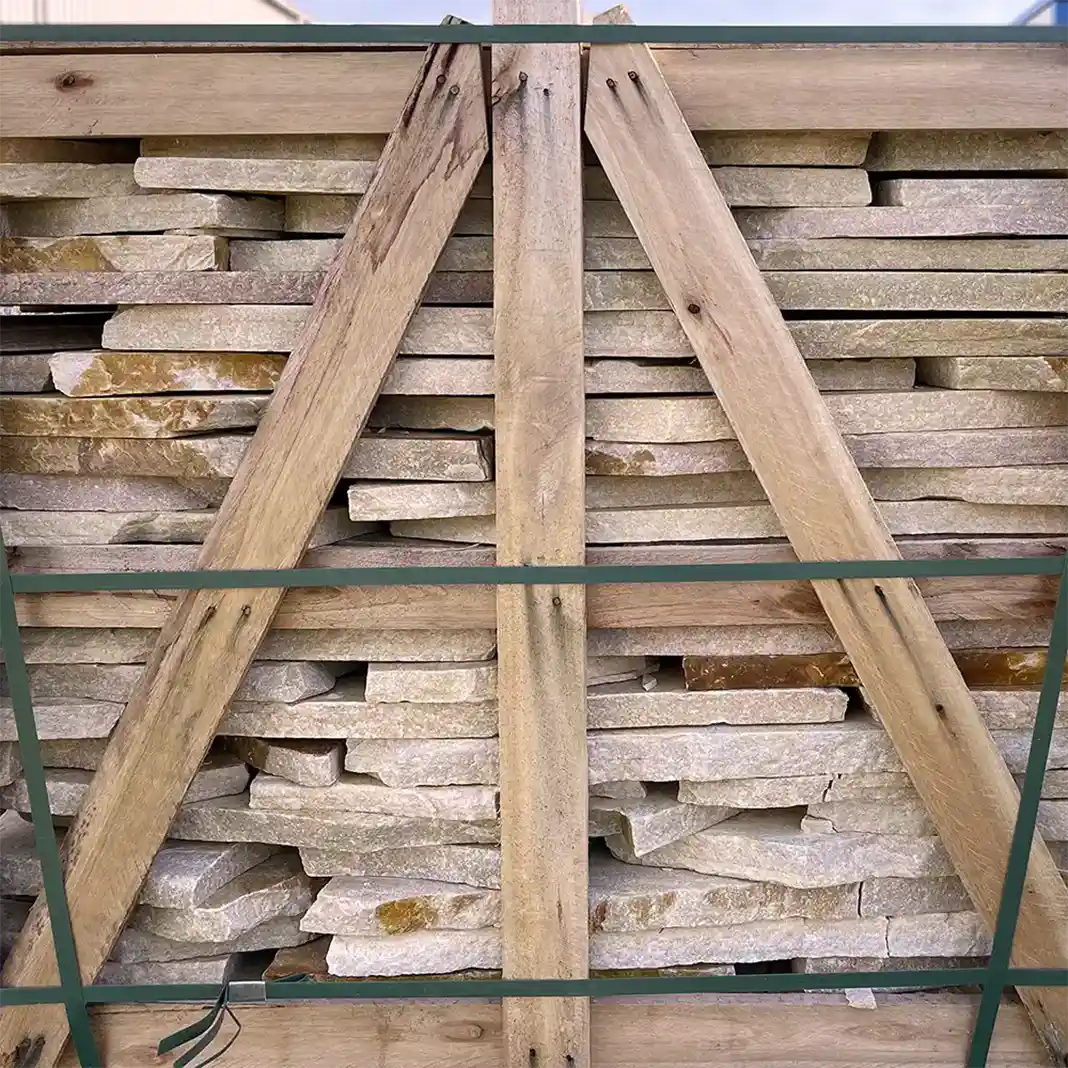


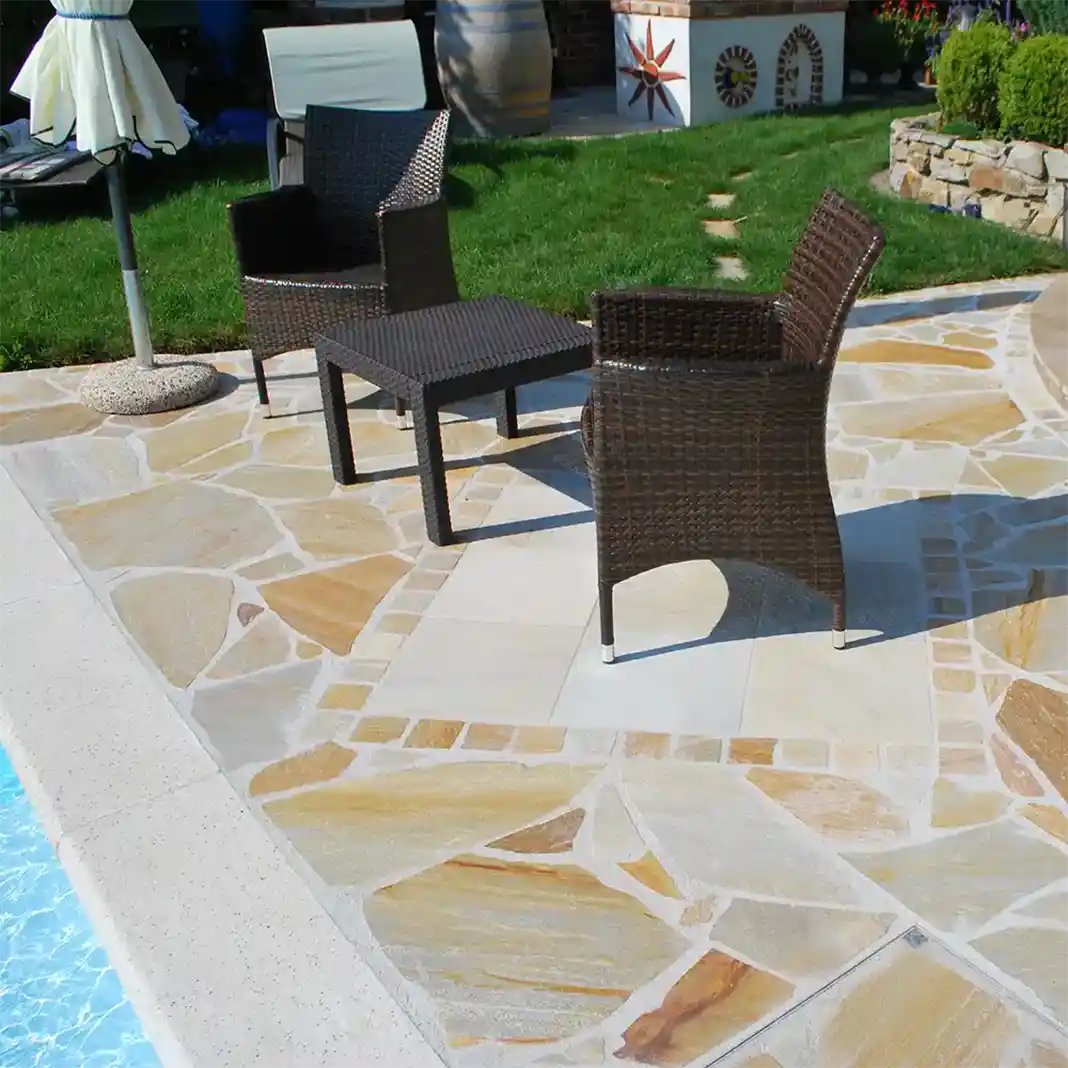
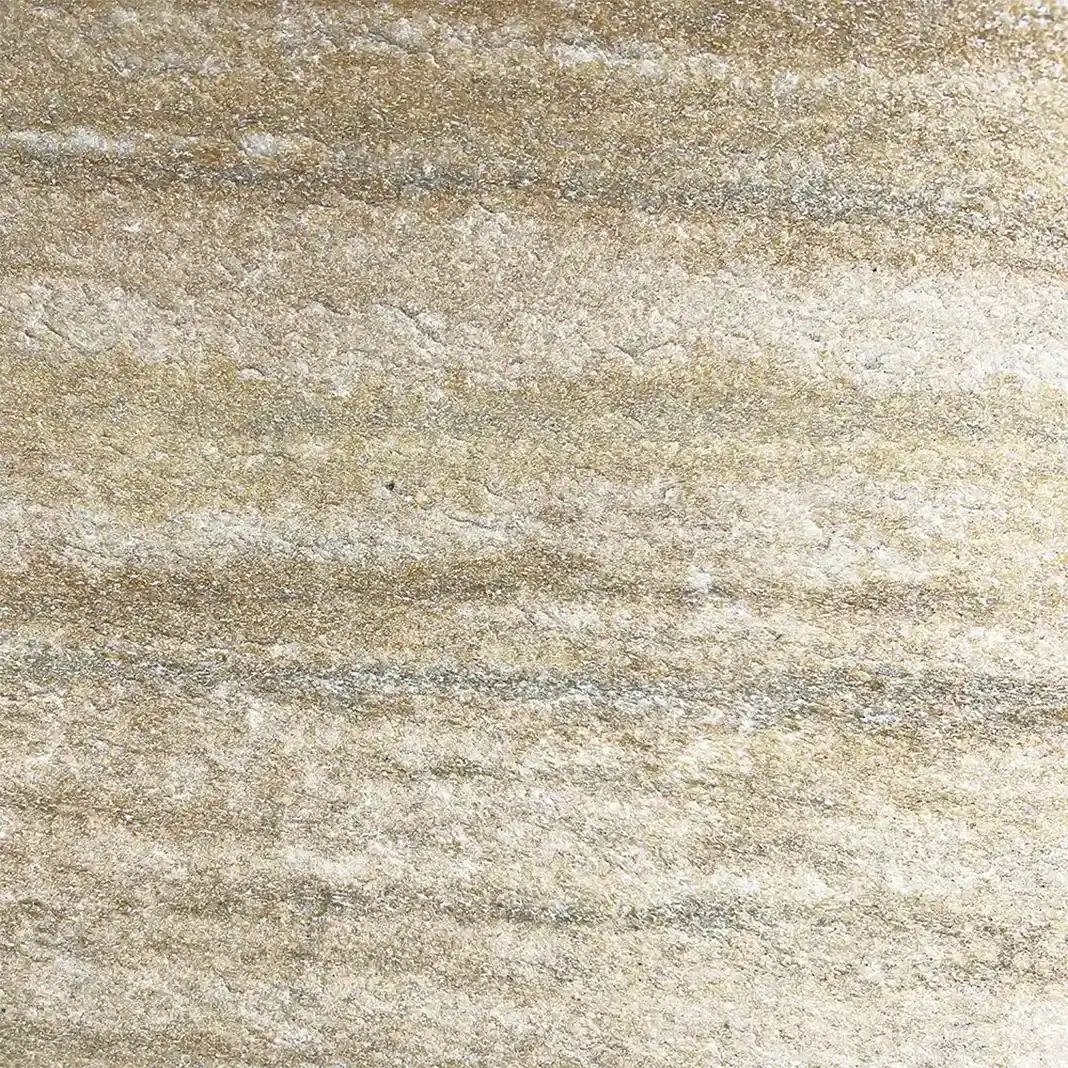
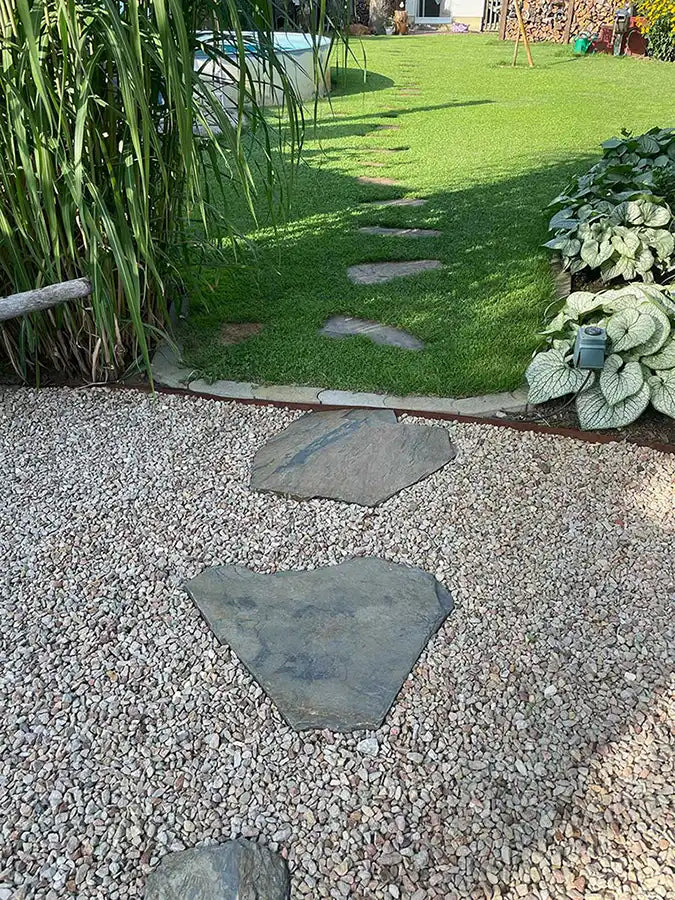
Stepping stones in the garden - Rustic and frost-resistant
Stepping stones made of natural stone are an ideal choice for gardens as they are rustic, frost-resistant, and relatively inexpensive. Stone slabs are naturally diverse in color and shape, allowing you to give your garden an individual look. Natural stone paths are an easy way to create a naturally beautiful pathway in your home garden. They are also an appealing way to create a garden path that can easily adapt to your garden design. Polygonal stone slabs are robust and durable and can typically last for decades. They are an easy way to create a garden design with walkway slabs that harmoniously flow through the garden.
How are natural stone slabs cleaned?
There are various ways to clean natural stone slabs.
- A gentle cleaner suitable for natural stones can help remove dirt and stains. In general, if you always remove dirt immediately, for example, water alone may be sufficient. This prevents it from penetrating into the pores of the stone. We always recommend prior impregnation.
- Steam cleaners are a good option for cleaning natural stone slabs. These devices remove dirt and dust without damaging the stone.
- A soapy solution can help remove dirt, oil, and other stains from the slabs. However, you should not leave the solution on the stone for too long, as it can damage the stone.
- Pressure washers are a good option for removing stubborn dirt and stains from natural stone slabs. However, when using a pressure washer, be careful to avoid damaging the stone. We recommend not getting too close to the stone and especially the joints with the pressure head.
- There are also special cleaning agents specifically designed for natural stone slabs. These products can help effectively remove dirt and stains without damaging the stone.
FAQ - Answers to frequently asked questions about natural stone slabs
What are natural stone slabs?
Natural stone slabs are slabs made from natural stones such as granite, marble, sandstone, travertine, slate, limestone, and quartzite. They are suitable for various purposes, such as the construction of pavements, terraces, patios, stair steps, and sometimes even as wall cladding. Natural stone slabs are durable, weather-resistant, and require little maintenance.
How are natural stone slabs produced?
The production of natural stone slabs depends on the type of stone and the size of the slab. Typically, a large stone block is broken from a quarry and cut or broken into smaller blocks or slabs.
Do natural stone patio slabs feel cold?
Yes, patio slabs made of natural stone feel cold. The reason for this is that natural stone is a natural conductor of heat and transfers the cold from the ground through the slabs. Therefore, they usually feel cool, especially at low temperatures. When the sun shines on the slabs, they warm up or heat up, depending on the type of stone they may retain the heat more or less even after sunset.
How does slate feel?
Slate natural stone feels cool and smooth to the touch. Naturally, it flakes off slightly at the edges. However, this is not noticeable when embedded in quartz gravel (joint mortar).
Are natural stone patio slabs sensitive?
It depends on the type of natural stone. In general, it can be said that hard stones and stones with a higher density such as Gneiss, Grauwacke, Quarzit, and Porphyry are insensitive and have a slightly non-absorbent property due to their density. Natural stone slabs made of Schiefer are also rather insensitive, but could show small chippings of the first layer due to their layered structure when subjected to force. On the other hand, limestone and sandstone can easily chip and are very susceptible to stains, which is why we do not offer these stones in our range. We generally recommend sealing the stones (Imprägnierung) and cleaning them regularly depending on the level of use. Once the surface of a stone no longer repels water (water test), it is time to reseal it.
Do natural stones scratch easily?
No, our Grauwacke and Quartzite stones are hard stones that are resistant and do not scratch. Slate slabs, on the other hand, have a smooth surface and are susceptible to scratches, although not as sensitive as soft stones (limestone and sandstone). In any case, we recommend surface protection through impregnation and if you handle them carefully, you can of course avoid scratching with slate.
Which natural stone slabs are suitable for laying on the terrace?
There are many different natural stone slabs that are suitable for laying on the terrace. Some popular options include granite, slate, gneiss, porphyry, graywacke, and quartzite slabs. All these types of natural stone slabs are very durable and can create a beautiful ambiance. However, it is important to consider the differences in the properties of each stone when choosing the right type of natural stone slabs for your own natural stone terrace in order to achieve optimal results. We are happy to advise you on this.
How do I lay my natural stone patio slabs myself?
We recommend the concrete-free installation with quartz gravel and synthetic resin as a substructure, as well as a joint made of quartz gravel joint mortar also with synthetic resin. For this purpose, we have written an installation guide. We advise you on this and actively support you if you wish. For DIY enthusiasts, we have developed an all-inclusive package for terraces, called COMPRESA, which offers a set starting from 10 m² that already contains everything needed for installation and grouting.
How much does it cost to lay natural stone patio slabs?
The cost of laying natural stone patio slabs depends on various factors such as the type and size of the slabs, the subsoil, the effort for materials and labor, as well as any transport and travel costs. Typically, one can expect costs between 90 to 150 euros per square meter for labor alone.
How to properly impregnate natural stone slabs?
Natural stone slabs should be roughly swept all around with a hand broom before laying them individually. After laying, the dry natural stone can be treated with impregnation to protect it from dirt and moisture. For this purpose, the impregnation is carefully applied only to the surface with a brush, so that the liquid does not run down or drip. It is important to ensure that only the surface and not the edges of the natural stone slabs are impregnated so that the resin can bond with the natural stone during grouting.
Which mortar for natural stone slabs?
A good choice for natural stone slabs is a flexible mortar suitable for outdoor applications. We recommend Quarzkies and resin. This type of mortar is typically water-permeable, dirt-repellent, and durable. It is also resistant to chemical and mechanical stresses. Another advantage is that it provides strong adhesion to the slabs, ensuring a long service life.
How do I care for natural stone slabs?
Natural stone slabs should be cleaned regularly. The best way to do this is with water and possibly a mild detergent, a soft sponge, or a brush. Do not use harsh cleaning agents or abrasives that can damage the stone. After cleaning, the stone should be rinsed with clear water.
Which surface for natural stone slabs?
There are 3 ways to build a substructure for laying your natural stones.
- The probably cheapest option is the so-called "Loose Fill". Here, the natural stones are placed on a bed of grit or gravel, grit or gravel is poured into the joints. The disadvantage here is that you constantly have loose grit and gravel on the slabs, you have to fill the joints with grit or gravel again and sweeping the natural stones becomes a test of patience, as you keep sweeping out the loose joint material.
- The Cement or Concrete Solution. In the concrete variant, you need a slope, steel mats, and expansion joints. You have to process everything at once as concrete hardens quickly. You do not have the right bond between natural stone and cement, cracks form afterwards, and so-called cement efflorescences form. Concrete is not frost-resistant and after processing, you have cement haze that is difficult to remove.
- The Premium Resin Solution. A gravel bed made of quartz gravel and resin is best suited for the substructure. You do not need to consider a slope as the water can simply drain into the ground. And due to the cement-free installation, you do not have to worry about cement efflorescences or broken concrete parts. This solution is frost-resistant, easy to maintain and clean, water-permeable, and offers an optical highlight through colored joint quartz gravel. In addition, you can carry out this simple installation completely on your own without a specialized company. And you can get advice and support at any time from the customer advisors and landscape builders of bruchsteinplatten.de. It is particularly noteworthy with this variant that it is durable and develops almost no need for repairs.

